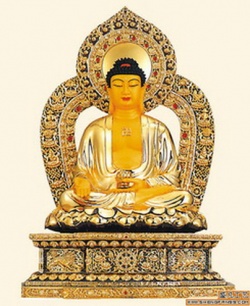Nfinite Life Sutra 02
Excerpt 2
With the power of meditative concentration and wisdom,
“Mara” does not refer to demons but to various afflictions that torture and torment us. The sufferings in this world are so painful that they are even more terrifying than encountering demons.
“Enmity” refers to enemy. The sutras talk about “ten evils the enemy.” The ten evils are the physical activities of killing, stealing, and sexual misconduct; the verbal activities of using false speech, divisive speech, harsh speech, and enticing speech; and the mental activities of greed, anger, and ignorance. These are the ten kinds of enemies within us. All beings are unwilling to do away with these “Mara’s enmity,” so the beings’ every thought and every deed strengthen and increase the ties to them. The knot of enmity becomes very hard to unravel and evil karmas continue to be committed. Consequently, the beings suffer in this lifetime and will suffer even more in the next lifetime.
This is why when one transmigrates within the Six Paths, one’s future lifetimes will get worse and worse, and one will sink into a lower and lower path. This is the truth. If we observe calmly, it will not be hard to see this.
“Subduing Mara’s enmity” is to teach us how to elevate our states and how to no longer retrogress. The Diamond Sutra talks about subduing one’s mind. This mind (in the Diamond Sutra) is “Mara’s enmity” mentioned above. What is this mind? The mind of the ten evils. The mind of wandering thoughts. The mind of afflictions. The mind of delusion. How do we subdue it? With meditative concentration and wisdom.
Therefore, we must cultivate meditative concentration. Only when we have meditative concentration will wisdom arise. When the Buddha taught all beings, his aim was for people to achieve the Threefold Learning of precept observation, meditative concentrationd wisdom. Observation of the precepts leads to the achievement of meditative concentration. And from meditative concentrationm arises.
Meditative concentration is pivotal to one’s learning and cultivation of Buddhism. Observation of the precepts is the means to achieve meditative concentration. Meditative concentration is the means to uncover wisdom. Uncovering wisdom is the true objective because only wisdom can help us solve all problems. Meditative concentration helps us suppress, subdue, and control Mara’s enmity; wisdom helps us eliminate it. Therefore, when our wisdom comes forth, the Ten Evil Karmas will become the Ten Virtuous Karmas and one’s enemies will become one’s great teachers and great supporters. This way, one is transformed from an ordinary person into a sage; suffering is transformed into happiness; and the Ten Dharma Realms are transformed into the One True Dharma Realm.
For every Buddhist school and Dharma door, wisdom is the objective of cultivation and meditative concentration is the key.
The Buddha-name chanting method is the most wondrous method of the eighty-four thousand Dharma doors. But after chanting the Buddha-name for a long time, why haven’t we achieved meditative concentration? The reason is that we do not have the foundation of precept observation. So, how can we attain the Buddha-name Chanting Samadhi when we have not even achieved Constant Mindfulness of Amitabha Buddha? From this we can see that observation of the precepts is immensely important. The precepts, however, are not limited to the Five Precepts, the Ten Precepts, the bodhisattva precepts, or the monastic precepts.
Some people think that they are abiding strictly by the precepts and thus feel great about themselves. They often criticize others for breaking the precepts. If this is how they “observe” the precepts, then they will never achieve meditative concentration. Why? Because when they see others transgressing the precepts, afflictions arise, and their minds become disturbed and are no longer pure.
Master Huineng put it aptly: “If one is a true practitioner, one will see no faults.” One should strictly adhere to the precepts with a pure mind. One should not be concerned whether others are pure or not, just keep one’s own mind pure.
If one thinks that one is observing the precepts and yet daily sees the faults of others, such cultivation will bring, at the most, only a little good fortune for one in the next lifetime. In addition, the good fortune may not be enjoyed in the human or heaven paths because one may not be reborn as a human or heavenly being.
Even animals, such as the pets kept by wealthy families, can have good fortune. In the path of hungry ghosts, there are also those with good fortune. For example, city gods, village gods, and mountain gods all enjoy offerings from people every day. [Good fortune notwithstanding,] when one’s cultivation leads one to such a plight, all of one’s efforts will be wasted!
Since ancient times in China, there were practitioners, both lay and monastic, who succeeded in their cultivation after three to five years of practice. Why is it that we don’t have any success today, even after twenty or thirty years of effort? If we say that it is because our intelligence or wisdom cannot compare with theirs, I don’t believe it. If we say that our good fortune cannot compare with theirs, I believe it even less.
What is the reason? It is that the practitioners in the past listened to their teachers, but nowadays we do not. They inherited their teachers’ lineage; today, people forsake their teachers.
When one’s teacher indicates a path for one, a path that will lead to success, [and if one follows that path accordingly,] one then “inherits the teacher’s lineage.” The teacher would help one lay a foundation for learning and practice. This is the teacher’s duty. If one does not have the foundation, one must not leave the teacher, just like a child must not leave its parents. When the child grows up and becomes independent, then he or she will be allowed to leave home.
In the past, one could leave one’s teacher only when one had attained fundamental wisdom. Fundamental wisdom is meditative concentration. When one attains meditative concentrationm will manifest. When empowered with meditative concentration and wisdom, one will then be allowed to leave one’s teacher and travel all over to learn from others.
Take Sudhana’s visits to fifty-three teachers, for example. Under the guidance of Manjusri Bodhisattva, he attained fundamental wisdom, which is “with the power of meditative concentration and wisdom.” With this ability, he was then allowed to visit fifty-three teachers. His visits to all fifty-three teachers is “subduing Mara’s enmity.”
The fifty-three teachers represent the fifty-three categories under which all walks of life are subsumed. In other words, we can interact with anyone, whether male or female, young or old, and from any occupation. By doing this, one is perfecting one’s acquired wisdom.
In a favorable situation, when one remains unaffected and greed does not arise; in an adverse situation, when one remains unmoved, undisturbed, and not tempted—this is attaining meditative concentration. In any situation, when one understands and is clear about everything—this is attaining wisdom. Thus, the “power of meditative concentration and wisdom” is the true basis of one’s learning and practice.
Nowadays the teacher’s lineage is broken. The only remedy is to take an ancient accomplished practitioner as our teacher.
In my life, my greatest good fortune was coming into contact with the tradition of a teacher’s lineage. When I was studying Buddhism in Taichung, Mr. Li Bingnan said modestly, “With my knowledge and virtue, I am not qualified to be your teacher.” He advised me to take Great Master Yinguang, who was his teacher, as my teacher.
Great Master Yinguang had already passed away, but his writings were still available. Single-mindedly learning and practicing the Collection of Great Master Yinguang’s Writings is becoming his student. Reading the great master’s books, following his teaching, and practicing accordingly is inheriting the teacher’s lineage.
As Pure Land practitioners, we take Amitabha Buddha as our teacher. Where is Amitabha Buddha? He is in the Infinite Life Sutra, the Amitabha Sutra, and the Visualization Sutra. When we single-mindedly and earnestly study these three sutras, we are taking him as our teacher and are his good students.
Chanting the sutras is cultivating the precepts, cultivating meditative concentrationd cultivating wisdom. When chanting a sutra one simply reads the words, without thinking of their meaning. Sincerely chanting this way is cultivating the precepts, meditative concentrationd wisdom.
The spirit of the precepts is “do nothing that is bad and do everything that is good.” “Do nothing that is bad” refers to the Theravada precepts. “Do everything that is good” refers to the bodhisattva precepts. In all the precepts, nothing falls outside of “do nothing that is bad and do everything that is good.”
When we respectfully and single-mindedly chant a sutra without wandering thoughts, discrimination, and attachments, then nothing bad is done. The Theravada precepts are fulfilled. The sutras are words of truth flowing from the Buddha’s true nature. Nothing surpasses these words in virtuousness. Therefore, chanting a sutra is “do everything that is good.” All the precepts are thus fulfilled.
Single-mindedly chanting a sutra without wandering thoughts, distractions, or doubt—this is cultivating meditative concentration. From the start to finish, clearly enunciating every word without mistake or omission—this is cultivating wisdom: fundamental wisdom. Thus, chanting a sutra is simultaneously cultivating the precepts, meditative concentrationd wisdom.
If one thinks about the meaning of the sutra while chanting it, it will ruin the cultivation of precept observation, meditative concentrationd wisdom. This is treating the sutra as a worldly book.
Chanting a sutra is cultivating the precepts, meditative concentrationd wisdom. As is sitting in meditation in the Zen school and reciting mantras in Tibetan Buddhism. The methods are different, but the results to be attained are the same. As it is said, “All Dharma doors are equal, and no one Dharma door is superior or inferior to another.”
When chanting a sutra, one should focus on chanting. If one wants to study it, one should find another time to do so and should not mix chanting with studying. Otherwise, one will fail completely in both.
When one attains meditative concentration and wisdom, the daily interaction with people and handling of matters and affairs will go smoothly. Obstacles will decrease naturally. One will be able to turn the ten evil thoughts into the ten virtuous thoughts and truly subdue Mara’s enmity. Buddhism often talks about “breaking through delusion and attaining enlightenment, and leaving suffering behind and attaining happiness.” These effects will truly manifest.


